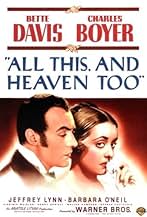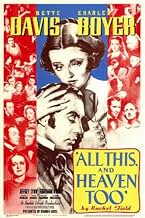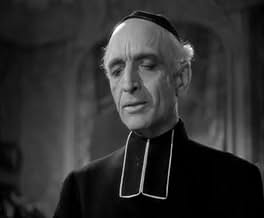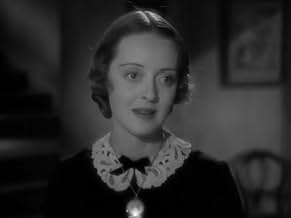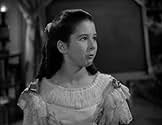Jalouse de sa servante Henriette Deluzy, qui se rapproche un peu trop de son mari à son goût, la Duchesse de Praslin la fait renvoyer, sans lettre de recommandation. Peu après, la Duchesse e... Tout lireJalouse de sa servante Henriette Deluzy, qui se rapproche un peu trop de son mari à son goût, la Duchesse de Praslin la fait renvoyer, sans lettre de recommandation. Peu après, la Duchesse est retrouvée assassinée et Henriette est arrêtée.Jalouse de sa servante Henriette Deluzy, qui se rapproche un peu trop de son mari à son goût, la Duchesse de Praslin la fait renvoyer, sans lettre de recommandation. Peu après, la Duchesse est retrouvée assassinée et Henriette est arrêtée.
- Réalisation
- Scénario
- Casting principal
- Nommé pour 3 Oscars
- 3 victoires et 3 nominations au total
- Berthe de Praslin
- (as Ann Todd)
Avis à la une
The film, except for the pro-Deluzy-Desportes slant, is excellent with a fine, restrained performance by Davis, an intense one by Boyer (who finally explodes in one scene where he shows his thorough hatred for his wife), and a marvelous performance by Barbara O'Neill as Fanny. I would thoroughly recommend this one for movie fans - a fine example of the best of Warner's historical films.
France is currently rediscovering Litvak who was brought down ,like so many great American directors (Zinnemann ,Wyler,Stevens),by the notorious critics of the Nouvelle Vague and their fusty Cahiers du Cinéma.But now their diktats are over and thanks to many contemporary historians of the French cinema (Bertrand Tavernier,Patrick Brion),he is given in the country which was another homeland to him the place he had always deserved.
"All this and Heaven too" might be my favorite Litvak movie,although his American career is as rich as that of any director .In spite of a historical gaffe ("that woman overthrew Louis Philippe "is as laughable as Marie Antoinette's sentence (which she never said) "let them eat cake".
La Restoration and Louis -Philippe: After the 1789 French Revolution ,the nobles emigrated and Napoleon ,who was eager for a Court,made a new nobility.His officers ,who were of common birth,were conferred a title :"Baron d'Empire" for instance;that was Henriette's grandfather's case.
Henriette is of that kind an old noble such as la Duchesse de Praslin can only treat like dirt;those nobles were impostors!With Henriette,it was hate at first sight,even before she became dear to the duke and the children.
That old nobleness,epitomized by the duchess ,was all bigotry,religion ,but they were socialites first.In the XIX th century ,those chic ladies did not care about their children they left to their governess .The Duchess was not alone: Balzac,Maupassant,Flaubert (Madame Bovary did not really like her daughter) and even a writer for children such la Comtesse de Segur painted a picture of the "bad" mother .The story happens in 1846-1847,and Louis -Philippe's days as a king are numbered.The writers are asking for Republic:Lamartine who is mentioned in the film,and Victor Hugo -who wrote the article about Henriette in la Conciergerie- were not the least ;the latter was forced to exile himself after the fall of the short-lived Second Republic (1948-1952).
Had he lived half a century before,the duke would have been part of the daring nobles such as La Fayette who fought for the Revolution.Even if we are not told so,his union was probably a marriage of convenience.The Duchess is egoistic,neurotic,hateful ,incapable of love and affection her children long for.A "pious " woman ,but a woman who uses a priest to keep a close watch on her husband.Note the presence of the priest in the bedroom of a dying child.
Litvak's directing is mind-boggling.He perfectly recreates the atmosphere of the desirable Hotel Particulier where the duke lives.His style is refined : the ball which we see on reflection on the mirrors is a scene Max Ophuls would have died for;the brief moment of happiness on Hallows Eve ;the snow ,symbol of purity:the duke is as virtuous and as loyal as Henriette.The performance in the THeatre Royal which the king attends and which finally backfires on the two heroes:Racine's "Phedre" -Rachel who is mentioned was the thespian of the era,her portrayal of the Greek heroine (whose situation is not unlike the chaste lovers') was praised to the skies then-.
The prologue and the epilogue are excellent: the long flashback is introduced in a very original way.Davis ,in front of the blackboard full of trigonometric formulas ,begins to tell her tale. One of her lines in the epilogue is the most moving in the whole film :"Now,you write the ending of my story" she tells her students .
An absorbing screenplay,where even a fairytale (do you want to be happy when you are young or later when you get older?/I'd rather be happy later:if I've got everything now,what can I expect from life afterward?) plays a prominent part.
French Charles Boyer and Bette Davis give superlative performances and the supporting cast(Barbara O'Neil almost steals the show from Davis sometimes) including the four children (special mention for little Reynald) is up to scratch.This is the Creme de la Creme of the melodrama genre.
Davis is a kick to watch as she struts her stuff with an excellent French accent. Boyer is awesome in this dark, brooding, but romantic role. And O'Neil deservedly got an Oscar-nomination for her role, full of anger and energy. But the real stand-out, interestingly enough, is Richard Nicols as Boyer's so-adorable-you-just-wanna-squeeze-him son Reynald.
Overall, this dark, dreary film is a highly-satisfying experience, slightly off-put by the preachy, silly final scene in the classroom.
You genuinely feel like these screen children love her. And, given the time period, you feel like Boyer does to.
This is a rather long film, but the direction is solid and it just keeps moving along.
The script is really solid as well. There is little wasted time. Everything clips along rather nicely and I was surprised at how I fell under the spell of this film...
Le saviez-vous
- AnecdotesJune Lockhart's first credited role (and second film). In addition, out of the four children starring in the movie, she was the only one to continue acting into adulthood.
- GaffesThe Duchess of Praslin is seen licking envelopes in which she has placed letters to her husband, the Duc de Praslin. This film is set in the 1840s; gummed envelopes would not be invented for another 100 years. Correspondence in the 1840s would not be placed in a #10 business envelope either, as seen in the film. The letters would be placed in another sheet of paper and then sealed over with a wax seal or simply folded over and sealed with a wax seal, and sometimes a ribbon would be set in the wax as well.
- Citations
Duc de Praslin: Why are you smiling? May I share whatever pleases you so?
Henriette Deluzy-Desportes: You will think I am very silly, I'm afraid, but standing here like this with the snow falling reminds of something I used to know. Do you remember a little round glass globe that...
Duc de Praslin: Oh yes, I know, with a snow scene inside. We had a paperweight on a desk at home like that. You shook it and the snow whirled around out from nowhere in a blinding storm.
Henriette Deluzy-Desportes: Yes, that's exactly what I mean.
Duc de Praslin: And if you looked closely enough the whole world seemed to be obliberated and shut out.
- ConnexionsFeatured in AFI Life Achievement Award: A Tribute to Bette Davis (1977)
- Bandes originalesThe War of the Roses
(uncredited)
Music by M.K. Jerome
Lyrics by Jack Scholl
Played on a spinet by Bette Davis
Sung by Ann E. Todd, Virginia Weidler and June Lockhart
Meilleurs choix
- How long is All This, and Heaven Too?Alimenté par Alexa
Détails
- Date de sortie
- Pays d’origine
- Langues
- Aussi connu sous le nom de
- El cielo y tú
- Lieux de tournage
- Société de production
- Voir plus de crédits d'entreprise sur IMDbPro
Box-office
- Budget
- 1 370 000 $US (estimé)
- Durée
- 2h 21min(141 min)
- Couleur
- Rapport de forme
- 1.37 : 1


